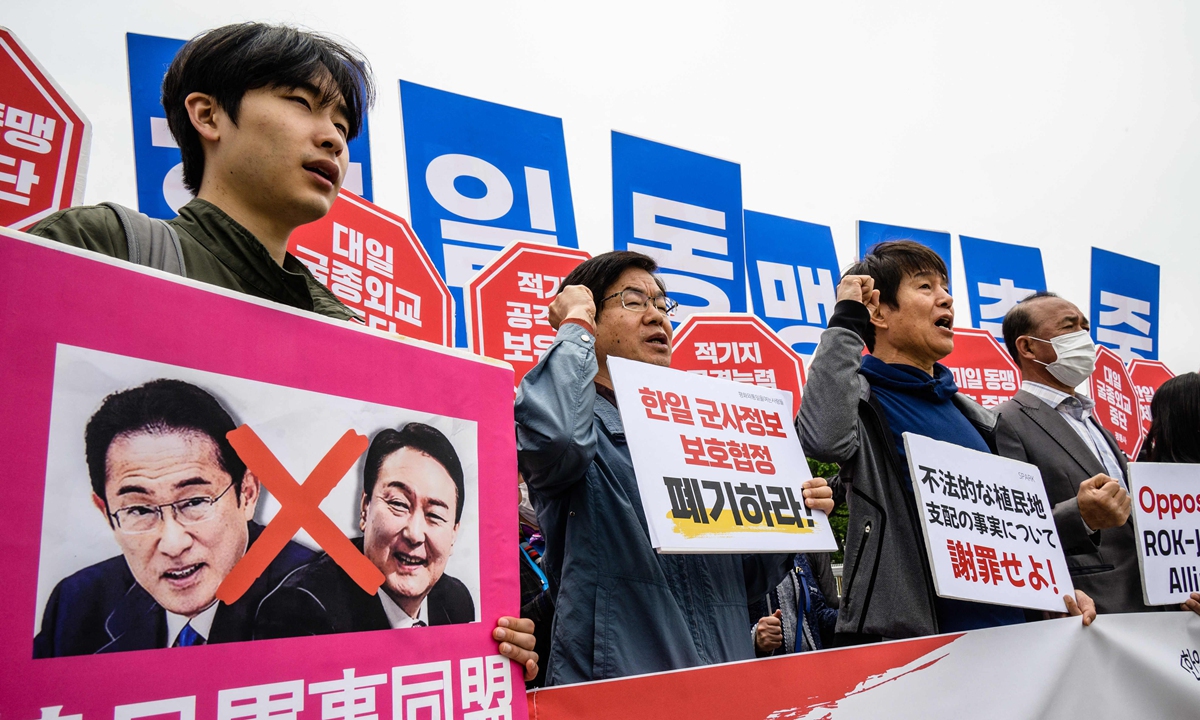
Protesters stage a rally to oppose a visit by Japanese Prime Minister Fumio Kishida in front of the presidential office in Seoul, South Korea, on May 7, 2023. The leaders of South Korea and Japan met on the day for their second summit in less than two months, following a first in Tokyo in March. Photo: VCG
Apparently, the relationship between Japan and South Korea is rapidly warming up. After South Korea President Yoon Suk-yeol visited Japan in March, and Japanese Prime Minister Fumio Kishida is scheduled to visit South Korea from Sunday to Monday, seeking to revive the "shuttle diplomacy" between the two heads of state.
But it is worth pointing out that this "warming-up" of bilateral ties is more of the result of the US' push from behind the scene. Prior to Yoon's US visit and his meeting with Biden, White House national security adviser Jake Sullivan said that Biden planned to highlight Yoon's "determination and courage" in his rapprochement with Japan during the visit. After Kishida announced his South Korea trip, US Ambassador to Japan?Rahm Emanuel sent celebratory messages on Twitter.
Nonetheless, the structural conflicts between Japan and South Korea including historical issues and territorial disputes will not ease due to Yoon's compromise in forced labor compensation but will exacerbate, which will lead to a lack of public support for this diplomatic "warming-up."
First of all, Yoon's compromise cannot bring about Japanese concessions to South Korea on historical issues. This will lead to the continuous ferment of conflicts between Japan and South Korea surrounding historical issues, and become an important lever for the opposition party to deal with Yoon. It will eventually cause Japan-South Korea relations to fall to a new low in the next few years. Regarding the issue of "forced labor," the Japanese government issued an official position as early as 2021, saying that references to "comfort women" in textbooks should not include any indication that the imperial Japanese military was involved in any portion of the operations.
Yoon's stance is actually an endorsement of Japan's official position. His compromise in historical issues to Japan is viewed as a bonus point of Kishida's South Korea diplomacy. This has made more than 60 percent of South Koreans dissatisfied with Yoon's attitude toward Japan and believe that he is weak. On Thursday, members of the opposition Democratic Party and civic groups staged a rally against the visit of Kishida. It is highly likely that Kishida will not issue a comprehensive and explicit apology for Japan's colonial rule to South Korea during his visit. This is making Yoon hard to get rid of the mark of his humiliating diplomacy toward Japan.
Meanwhile, the territorial dispute over Dokdo?Islands, or what Japan refers to as Takeshima, has been a great cause of concern between the two sides. After Yoon left Japan, the Japanese government released its Diplomatic Blue Book on April 11 which renewed Japan's territorial claim to the islands. On the same day, South Korea's Foreign Ministry summoned Naoki Kumagai, deputy chief of mission at the Japanese Embassy in Seoul, to make a strong protest. After Kishida announced his visit to South Korea, Rep. Jeon Yong-gi of the Democratic Party visited the easternmost islets of Dokdo. The Japanese Foreign Ministry then said in a statement that "it is extremely regrettable that we cannot accept it at all," while the South Korean Foreign Ministry rejected the protest and called it an "unfair claim."
Last but not least, Japan's nuclear-contaminated waste water dumping plan has also provoked conflict with South Korea. Yoon in March called for Japan to conduct a scientific analysis before releasing treated radioactive water into the sea. Nonetheless, Kishida plans to win support from G7 countries when Japan hosted the summit in Hiroshima. Since South Korea has accepted Japan's invitation to attend the summit, it is expected that Kishida will take the chance of his visit to win Yoon's support in Japan's dumping plan.
To sum up, the rapid "warming up" of Japan-South Korea relations can be described as "following the script of the US government" step by step. Although the two countries emphasize the need for "future-oriented cooperation," in essence they are more actively cooperating with the regional strategic layout of the US to contain China, that is, to promote bloc politics and camp confrontation in terms of security, and to build an exclusive wall aimed at decoupling. The "warming up" of Japan and South Korea's diplomacy is internally a forced matchmaking based on the lack of national consensus, and externally it has the negative effect of "security overriding the economy", which will continue to worsen the hard-won peace and security in Northeast Asia. Therefore, the answer to how far this diplomatic "warming up" can go is already on the horizon.
The author is a senior research fellow at Center for Asia-Pacific Studies, the Institute for Foreign Policy Studies under the Shanghai Institutes for International Studies. opinion@globaltimes.com.cn




